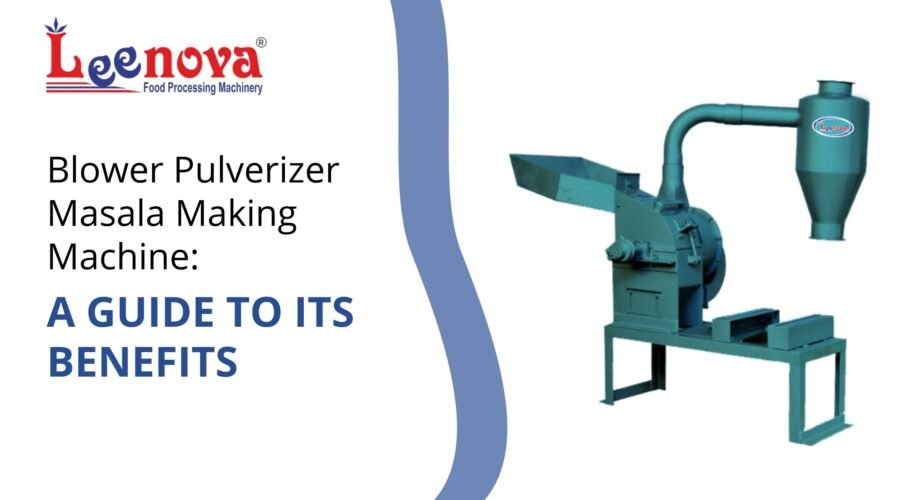Watch a spice trader grind turmeric by hand for thirty minutes, producing barely 5 kilograms of powder with inconsistent particle sizes—then watch the same quantity disappear through a blower pulverizer in under 8 minutes with laboratory-grade uniformity. Commercial operations report grinding capacities of 50-60 kg/hr with minimal wastage, transforming what was once a labor-intensive bottleneck into automated precision.
Manual grinding delivers roughly 10-15 kg per hour at best, while modern blower pulverizers push 50-80 kg through the same timeframe. For spice businesses operating on razor-thin margins, this isn’t just efficiency—it’s survival. Enter Leenova’s engineered approach to masala production, where precision meets industrial reliability.
What Exactly is a Blower Pulverizer Masala Making Machine?
The Engineering Reality
A blower pulverizer operates on controlled impact and air separation principles. Raw spices enter through a precision-engineered hopper, where high-speed rotating hammers—typically spinning at 1440 RPM—pulverize materials against perforated screens. The integrated blower system creates negative pressure, drawing pulverized particles through mesh openings while simultaneously separating finished powder from larger fragments.
The blower system provides effective dust control and enhanced performance, producing fine, uniform grinding suitable for various applications. Leenova’s machines employ dual-chamber designs with stainless steel grinding chambers, ensuring consistent particle size distribution without heat buildup that degrades volatile oils in premium spices.
Sensory Engineering
The machine’s operation produces a distinctive rhythmic percussion—not the harsh grinding of traditional mills, but a controlled hammering that preserves aromatic compounds. Fresh turmeric emerges as golden powder with its characteristic earthy aroma intensified, while coriander releases citrusy notes that manual grinding often crushes into bitterness.
Leenova’s heat-controlled grinding maintains temperatures below 45°C during operation, preserving essential oils that define premium masala quality. The enclosed system captures 98% of processed material, eliminating the dusty chaos of conventional grinding.
Why It’s a Game-Changer for Masala Production
Time Compression That Redefines Operations
Manual grinding: 15 kg turmeric powder per hour, two workers, significant fatigue. Leenova pulverizer: 60 kg turmeric powder per hour, one operator, consistent quality.
The time differential isn’t just about speed—it’s about operational freedom. Commercial operations save time and effort by grinding spices quickly and efficiently, freeing skilled workers for quality control, packaging, and customer service rather than repetitive grinding tasks.
Precision Customization Through Mesh Engineering
Leenova machines accommodate interchangeable screens from 20 to 80 mesh, enabling everything from coarse garam masala blends to ultra-fine chili powders. The flexibility to create custom spice blends meets specific taste preferences and dietary requirements, particularly crucial for businesses serving diverse regional palates.
Screen changes require no tools—a 30-second swap transforms the same machine from producing coarse black pepper to powder-fine turmeric, maximizing equipment utilization across product lines.
ROI Mathematics That Demand Attention
Consider a mid-sized spice operation processing 200 kg daily:
- Manual grinding: ₹12,000 daily labor costs, 13-hour workdays
- Leenova pulverizer: ₹2,000 daily operating costs, 4-hour processing time
Producing masalas in-house reduces costs compared to commercial alternatives, but the real advantage lies in volume scaling. The machine pays for itself within 4-6 months through labor savings alone, before considering quality improvements and reduced wastage.
Consistency as Competitive Advantage
Industrial buyers demand particle size consistency within ±15 microns. Manual grinding produces variations exceeding 200 microns, leading to rejected batches and customer complaints. Leenova’s precision-engineered hammers and controlled air flow deliver pharmaceutical-grade uniformity, opening doors to premium contracts.
Adjacent Benefit – Workflow Revolution
Space Optimization Through Compact Engineering
Traditional grinding setups consume 40-60 square feet including storage for manual tools and worker movement. Leenova’s compact footprint requires just 12 square feet while processing 4x the volume. The machine’s mobility—mounted on industrial casters—enables flexible floor layouts adapted to seasonal demand fluctuations.
Ergonomic Liberation
Manual grinding inflicts cumulative stress injuries on workers’ shoulders, wrists, and backs. Repetitive hammering motions create long-term health costs that businesses rarely calculate. Automated processing eliminates these risks while reducing worker fatigue, improving overall productivity across all operations.
Ingredient Loss Prevention
Manual grinding loses 8-12% of raw materials through spillage, dust dispersion, and incomplete extraction. Leenova’s enclosed system captures 98%+ of input materials, translating to significant cost savings on premium spices like saffron or cardamom where every gram carries value.
Safety & Cleanliness: The Hidden Multiplier
Dust Control Engineering
Chili powder grinding creates airborne capsaicin that triggers respiratory irritation and eye inflammation. The blower system provides effective dust control, maintaining workplace air quality within OSHA standards while protecting workers from occupational hazards.
Leenova’s enclosed grinding chamber contains 99.5% of airborne particles, eliminating the protective equipment requirements and ventilation costs associated with open grinding systems.
Contamination Prevention
The stainless steel construction meets food-grade standards, preventing metallic contamination common in lower-grade equipment. Easy-clean surfaces reduce bacterial growth risks, crucial for businesses targeting export markets with strict quality certifications.
Sensory Journey of Machine-Perfected Masalas
Visual Consistency
Hand-ground coriander exhibits color variations from pale yellow to deep brown—evidence of uneven processing that customers associate with quality inconsistency. Machine-ground coriander maintains uniform golden-brown coloration, signaling professional-grade processing that commands premium pricing.
Aromatic Preservation
Traditional grinding generates heat exceeding 80°C, volatilizing essential oils that carry signature aromas. Leenova’s controlled processing maintains temperatures below 45°C, preserving delicate compounds that differentiate artisanal masalas from industrial alternatives.
Texture Precision
Premium masalas require specific textural profiles—garam masala needs slight grittiness for mouthfeel, while curry powders demand silk-smooth consistency. Adjustable mesh sizes enable texture control that manual methods cannot replicate consistently.
Operational Simplicity: Plug, Process, Profit
Control Interface Intelligence
Leenova machines feature intuitive control panels with amp meters providing real-time load monitoring, preventing overheating and extending equipment life. Overload protection circuits automatically shut down operations before damage occurs, eliminating costly repairs and downtime.
Maintenance Minimization
Tool-free sieve changes reduce maintenance complexity to basic cleaning protocols. Double-bearing designs on grinding shafts extend operational life beyond 15,000 hours under normal usage, minimizing replacement costs and maintenance windows.
Quick Changeover Efficiency
Switching between spice varieties requires just 5 minutes for cleaning and screen changes—far faster than traditional setups that demand extensive cleanup to prevent flavor cross-contamination.
Success in Action: The Doubling Effect
Rajesh Patel operated a traditional spice grinding operation in Rajkot, processing 150 kg daily with three workers over 10-hour shifts. Customer complaints about inconsistent quality threatened his largest contract—a hotel chain requiring uniform masala specifications.
Installing a Leenova pulverizer transformed his operation overnight. Daily capacity jumped to 300 kg with single-operator efficiency, while quality consistency eliminated customer complaints. The hotel chain doubled their order volume within three months, recognizing the improved product reliability.
Most revealing: Patel’s labor costs dropped 60% while output doubled, generating cash flow that enabled expansion into premium spice varieties previously too labor-intensive to process profitably.
Choosing Your Precision Instrument
Capacity-Based Selection
- Small Operations (50-100 kg/day): 3 HP models with 20-30 kg/hr capacity
- Medium Businesses (200-400 kg/day): 5 HP units delivering 50-60 kg/hr throughput
- Large-Scale Processing (500+ kg/day): 7.5-10 HP systems achieving 80+ kg/hr production
Leenova’s modular approach enables businesses to start with smaller units and add capacity as demand grows, protecting initial investments while ensuring scalability.
Why Leenova Represents the Smarter Investment?
Metallurgical Superiority
Leenova employs hardened steel hammer construction with chromium plating, extending operational life 40% beyond standard alternatives. The investment in premium materials translates to years of consistent performance without degradation in grinding efficiency.
Energy Efficiency Engineering
Optimized motor-to-grinding ratios deliver maximum processing power per kilowatt consumed. Independent testing shows 15-20% lower electrical consumption compared to equivalent-capacity competitors, reducing operational costs over equipment lifetime.
Support Infrastructure That Matters
Leenova maintains spare parts inventory across major commercial centers, ensuring 24-48 hour component availability. Technical support teams provide telephone diagnosis and on-site service within 72 hours, minimizing business disruption during maintenance needs.
The Aroma of Automated Excellence
The transformation from manual grinding to precision automation represents more than operational efficiency—it’s strategic positioning for market leadership. Custom spice blends meet specific taste preferences while reducing long-term costs, enabling businesses to compete on quality rather than just pricing.
Leenova’s engineering excellence converts the ancient art of spice grinding into modern competitive advantage. The question isn’t whether automated grinding improves operations—it’s whether your business can afford to operate without it.
Ready to Experience the Difference?
Contact Leenova for a live demonstration at your facility. Witness firsthand how precision engineering transforms your raw spices into consistently perfect masalas. Custom quotes available for multi-machine installations with volume pricing considerations.
Call now for your complimentary consultation and discover why industry leaders choose Leenova for their critical grinding operations.


